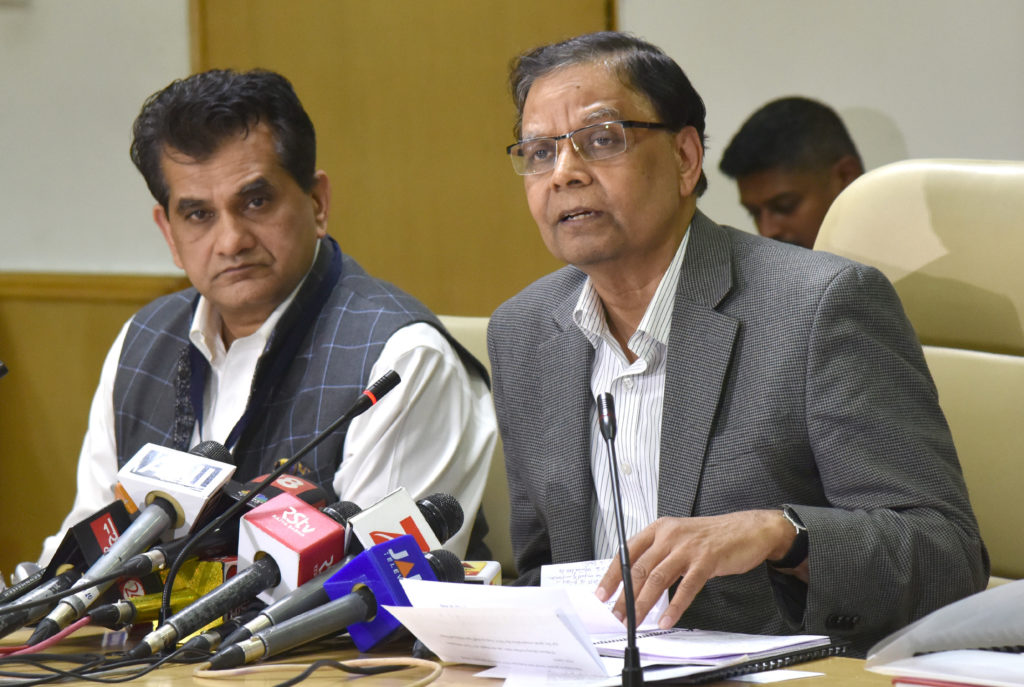Modi advocates Jan-Dec fiscal year at the NITI Aayog Meet

Dr Arvind Panagariya, the Vice Chairman, NITI Aayog, briefing the media after the Governing Council meeting, in New Delhi
Sunday witnessed another thought-provoking meeting in the Indian capital, where Prime Minister Narendra Modi proposed yet another set of reforms while addressing the third NITI Aayog Governing Council meeting. Is it a warm-up before July 1?
The NITI Aayog Governing Council meeting was attended by the chief ministers of several states, in which they discussed a changing paradigm in the arrangements of the Indian elections and fiscal term. The prime proposals that were debated in the meeting were holding simultaneous elections to Parliament and legislatures and changing the financial term to January-December from the existing April-March.
‘New India’ Vision
Prime Minister Narendra Modi, in his opening address to the third meeting of the Governing Council of NITI Aayog, emphasised that the vision of ‘New India’ can only be realised through the combined effort and cooperation of all states and chief ministers. Referring to the assembly as ‘Team India’, the prime minister, who has already made headlines with his regular announcements in governing reforms, said that it is the collective responsibility of this gathering to envision the India of 2022 – the 75th anniversary of independence – and see how the nation can swiftly move forward to achieve these goals.
Modi cited that the government was instrumental in allocating and raising the funds for the states by 40 pc between 2014-15 and 2016-17. Referring to the Goods and Services Tax (GST) Bill, Modi pointed out its strength by saying, “GST reflects the spirit of one nation, one aspiration and one determination.”
One of the primary agendas of the meeting, the prime minister pointed out in his opening speech, was a debate and discussion on simultaneous elections, which according to him, will bring the much-needed poise in India.
NITI Aayog has been taking steps to transform India, with fresh vigour: PM @narendramodi at the 3rd Governing Council Meet #TeamIndia pic.twitter.com/NDTJOZxu9V
— NITI Aayog (@NITIAayog) April 23, 2017
Change of budgetary dates to support farmers: PM
Changing the financial year date would also mean a change in the presentation of Union Budget. Speaking of the historic change, the prime minister said that this would enable timely availability of funds at the beginning of the financial year. Earlier, budgeted scheme funds were generally not approved by Parliament till May, after which they would be communicated to states and ministries. By that time, the monsoon would have arrived. Hence, the best working season for schemes was typically lost.
Modi, in his opening speech, also mentioned ending of the distinction between plan and non-plan expenditure, based on the recommendation of the Rangarajan Committee in 2011, which had found the distinction to be counter-productive. Several important items of expenditure were included as ‘non-plan’ and hence neglected. Hereafter, the emphasis would be on distinguishing between development and welfare expenditure on one hand, and administrative overheads on the other.
Praising the new initiatives, the chief minister of Rajasthan, Vasundhara Raje showed support and gratitude to the prime minister in a recent tweet. She said, “This is an amazing initiative to remove the distinction between planned and non-planned expenditure. I also congratulate the NITI Aayog for their visionary document.” Speaking about the Vice Chairman of NITI, Dr Arvind Panagariya’s presentation that sets out the new approach, which envisages a 15-year, long-term vision, accompanied by a 7-year strategy and a 3-year action agenda, she said, “Rajasthan shall align its initiatives & development roadmap to this vision.”
The chief minister of Maharashtra, Devendra Fadnavis, after the meeting, said in a statement to the media, “The NITI Aayog document is envisaged for a term of 12 years from 2018 to 2030 and Maharashtra is completely in support of this long-term strategy.”
Compelling consequences quandary
The proposals by the prime minister once again fuelled debates and raised questions on his headline-friendly measures. Experts have cited the example of the government being blind-eyed to the farmers in Tamil Nadu, where they are demanding basic rights and mocked the PM for being fake and hypocritical in his statements, where he says that these reforms would help India face-lift its agricultural premise. One can also recall a similar suggestion of changing the dates of the financial year being rolled out earlier, which a committee appointed by Modi had ruled out.
Moreover, the meeting at the Rashtrapati Bhavan also witnessed the customary absence of Mamata Bannerjee, the chief minister of West Bengal, and Arvind Kejriwal, the chief minister of Delhi. However, there were representations from non-BJP-ruled states in the meeting, such as Punjab chief minister, Captain Amarinder Singh, Bihar’s Nitish Kumar, Karnataka’s Siddaramaiah and Tripura’s Manik Sarkar.
Siddaramaiah, in a tweet, however, showed support and intent after the meeting. He said, “I look forward to a collaborative relationship with colleagues in other states and at the centre in the best interest of people of Karnataka and India.”
The prime minister has made his intentions clear and has diplomatically solicited the states to rake up the capital expenditure and infrastructure creation along with legislative arrangements in the meeting. Quite evidently, the meeting sent clear indications of a warm-up phase for the upcoming GST roll-out date (July 1), however, the country is left wondering if there are more path-breaking, Modiesque reforms in the pipeline.









